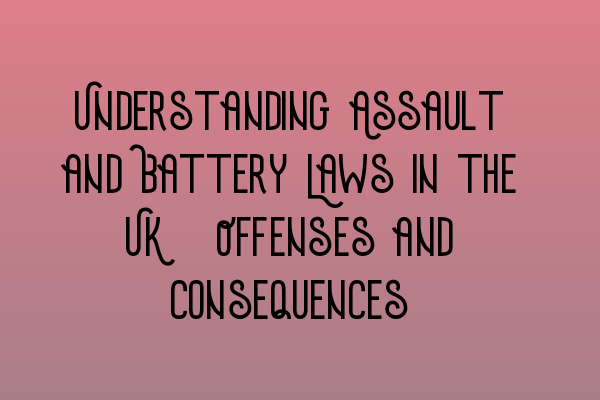Understanding Assault and Battery Laws in the UK: Offenses and Consequences
Assault and battery are two common criminal offenses that can have serious legal implications in the UK. It’s important to have a clear understanding of these laws to protect your rights and avoid facing severe penalties. In this blog post, we will dive into the details of assault and battery offenses, their consequences, and how they are dealt with in the UK legal system.
What is Assault?
Assault is the intentional act of causing apprehension of harmful or offensive contact with another person. It’s crucial to note that physical contact is not necessary for an act to be considered assault. The mere threat of harm or offensive contact can constitute an assault offense.
There are several types of assault offenses with varying degrees of severity. The most basic form of assault is known as Common Assault, which includes any act that causes someone to fear immediate personal harm. This can be a simple act such as raising a fist or verbally threatening someone.
Another type of assault offense is Actual Bodily Harm (ABH), which involves causing physical harm, such as cuts, bruises, or injuries that require medical attention. More severe cases of assault, such as Grievous Bodily Harm (GBH) or Wounding with Intent, involve causing severe injuries that can lead to long-term health complications or even death.
What is Battery?
Battery, on the other hand, refers to the intentional act of physically touching another person without their consent or lawful justification. Unlike assault, battery requires physical contact to occur. It can range from simple acts like pushing or slapping someone to more severe forms of physical violence.
Battery can lead to criminal charges, even if the physical harm caused is minimal. The severity of the offense depends on the level of harm inflicted, the intention behind the act, and the circumstances surrounding the incident.
Difference Between Assault and Battery
Assault and battery are often used together, but it’s important to understand the distinction between the two. Assault refers to the threat of harm or offensive contact, whereas battery refers to the actual physical contact or forceful touching.
Consequences of Assault and Battery Offenses
Assault and battery offenses are taken very seriously in the UK legal system, as they can cause physical and psychological harm to the victims. The consequences can vary depending on the specific offense and its severity.
For less severe cases of assault or battery, individuals may be charged with summary offenses, which can result in fines, community service, or a short-term prison sentence. On the other hand, more severe cases, especially those involving GBH or Wounding with Intent, can lead to long-term imprisonment. The severity of the offense and any previous criminal record of the offender can also influence the consequences.
Seeking Legal Advice
If you have been accused of assault or battery, it’s crucial to seek legal advice from a qualified criminal solicitor. They can guide you through the legal process, explain your rights, and help build a strong defense to protect your interests. With their expertise, you can ensure that your case is properly represented in court.
To prepare for the SQE exams and enhance your knowledge of Criminal Law and Practice, check out our SQE 1 Preparation Courses and SQE 2 Preparation Courses. These courses are designed to equip aspiring solicitors with the necessary skills and knowledge to excel in their professional journey.
Stay updated with the latest information on SRA SQE Exam Dates to plan your preparation effectively. It’s essential to be well-prepared to demonstrate your legal knowledge and understanding during the examination.
Conclusion
Assault and battery offenses carry serious legal consequences in the UK, from fines and community service to imprisonment, depending on the severity of the offense. Understanding the differences between assault and battery, as well as the legal implications surrounding each offense, is important to protect your rights.
If you are facing assault or battery charges, it’s crucial to seek legal advice from a qualified criminal solicitor who can guide you through the legal process. Additionally, remember to prepare for your SQE exams by enrolling in our SQE 1 Practice Exam Questions and SQE 1 Practice Mocks FLK1 FLK2 to enhance your legal knowledge and boost your chances of success.
Remember, being knowledgeable about the law can help you navigate potential legal issues more effectively and protect yourself from unintended criminal consequences. Stay informed, be aware of your rights, and seek professional legal advice whenever needed.
